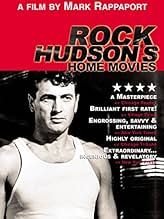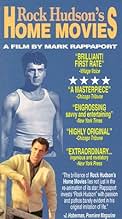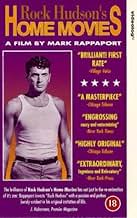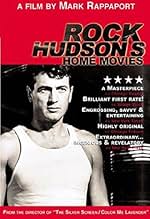Documentary about the career and eventual death from AIDS of actor Rock Hudson.Documentary about the career and eventual death from AIDS of actor Rock Hudson.Documentary about the career and eventual death from AIDS of actor Rock Hudson.
- Awards
- 1 win & 1 nomination total
Lauren Bacall
- Self
- (archive footage)
Cyd Charisse
- Charlotte King
- (archive footage)
Doris Day
- Jan Morrow
- (archive footage)
Angie Dickinson
- Self
- (archive footage)
Kirk Douglas
- Self
- (archive footage)
Linda Evans
- Self
- (archive footage)
Phyllis Gates
- Self
- (archive footage)
Rock Hudson
- Self
- (archive footage)
Burl Ives
- Dr. Brits Jansen
- (archive footage)
Otto Kruger
- Edward Randolph
- (archive footage)
Paul Lynde
- Mr. Akins
- (archive footage)
Dorothy Malone
- Self
- (archive footage)
Jeff Morrow
- John Doherty
- (archive footage)
Maria Perschy
- Isolde 'Easy' Müller
- (archive footage)
Paula Prentiss
- Abigail Page
- (archive footage)
- Director
- Writer
- All cast & crew
- Production, box office & more at IMDbPro
Storyline
Did you know
- GoofsIn the closing credits, Twilight for the Gods (1958) is incorrectly credited as "Twilight of the Gods (1958)."
- Quotes
[first lines]
Rock Hudson: It was all up there.
- ConnectionsFeatures A Farewell to Arms (1932)
Featured review
During the late 50s and sixties, the critical world embraced a concept known as the auteur theory. As presented by the French, the theory suggested that some directors were the "authors" of their films because they, basically, left their fingerprints all over the finished films. Film scholars examined films frame by frame looking for repeated themes, philosophies, symbolism, tricks and trademarks that directors would utilize in storytelling. The auteur theory has some validity, as well as some drawbacks, not the least of which being the tendency to equate bad films with the good, to praise redundancy and similarities over innovation and variety and to celebrate the artist more than the art.
The auteur theory was applied mostly to directors, sometimes to writers, occasionally to producers, but never to actors. The exception being -- sorta -- ROCK HUDSON'S HOME MOVIES. This ragtag documentary assembled by Mark Rappaport uses the methodology usually granted to studying directors to examine the various films of the late actor, not so much to grant him authorship status, but to look for cracks in the actor's closet door. Part scholarly research, part scandal sheet journalism, part trivia game, part student project, the film attempts to seriously examine Hudson's gay legacy and to ridicule his well-crafted screen image as the ultimate in heterosexual masculinity. The result is as creepy as it is scientifically unsound.
Rappaport apparently scoured his video tape collection and the late, late show for snippets of film from Rock's movies that somehow could be interpreted as a commentary on Hudson's secret sex life. This hodgepodge of clips (presumably not legitimately acquired from their sources) is a collection of grainy, blurry copies of copies, often with equally bad sound. The film, however ambitious, doesn't look particularly professional. Even so, the effort is notable and the finished product cohesive. For an amateur film, it is thoughtfully crafted.
And some of it is clever and amusing, especially, for instance, when Rappaport takes a look at the Rock Hudson/Doris Day romantic comedies of the 50s which frequently featured Hudson placed in dubious situations where his manhood and masculinity are brought into question. The gay man playing a straight man pretending to be a gay man seemed to be a joke shared by most everybody in Hollywood and with virtually nobody in the audience.
Yet, there is something grimly dishonest and perhaps even mean-spirited about the film's attitude. Rappaport takes his snippets of film, dialogue and images and uses them out of context. Any mention of the word "gay," any reference to marriage, any interaction between Rock and another man is interpreted as having a homosexual subtext, even if that was obviously not the intent; the irony being apparent only in hindsight. Likewise, any reference to death is noted as a harbinger of AIDS, even if it is buried in a film made twenty or thirty years before Hudson's actually died of the disease. To say that Rappaport is reaching in some of his assumptions is an understatement; but he packs his innuendoes into tight clusters of montage, hoping that the viewer won't notice the weakness of his evidence.
If the film were presented as merely an amusing trifle, with Rappaport's assumptions made with tongue firmly in cheek, then his questionable approach would be forgivable. But the film takes itself far too seriously, especially in presenting the narrative in the first person. On screen Hudson narrates through Eric Farr, an actor who doesn't look, sound or act in any way that brings the real Hudson to mind. Yet, he narrates the clips as though he were speaking as Rock, presenting Hudson as being bitter, condescending, snide and sarcastic. Quoting out of context or even paraphrasing is one thing, but to totally fabricate another man's thoughts crosses an ethical and dramatic line. Rappaport apparently thinks by having his opinions expressed as though they were really Hudson's that they would have greater credibility. But to use a distorted image of Hudson to criticize the way Hollywood distorted Hudson's image seems more hypocritical than inspired. And to assume that homosexuality should be obvious to anyone who watches for the clues is a bit homophobic, gaydar being far from an exact science.
Clip films like this are not unusual -- Hudson hosted one such film on the career of Marilyn Monroe -- but generally the point is to celebrate the life of the subject. ROCK HUDSON'S HOME MOVIES presents its subject with a mixture of contempt and pity, seemingly equally angered by the way Hollywood used the star and by the way the actor allowed himself to be used. Rappaport tries to make us see Hudson's story as a tragedy: Gay man being oppressed into silence by homophobic society. But, even taking into account his well publicized death, Rock Hudson seems to have led a remarkably successful and rewarding life, maintaining his star status, earning critical respect and enjoying genuine admiration by the public and his peers, right up to and after his death. The one part he never seemed to play was martyr; this movie can't change that.
The auteur theory was applied mostly to directors, sometimes to writers, occasionally to producers, but never to actors. The exception being -- sorta -- ROCK HUDSON'S HOME MOVIES. This ragtag documentary assembled by Mark Rappaport uses the methodology usually granted to studying directors to examine the various films of the late actor, not so much to grant him authorship status, but to look for cracks in the actor's closet door. Part scholarly research, part scandal sheet journalism, part trivia game, part student project, the film attempts to seriously examine Hudson's gay legacy and to ridicule his well-crafted screen image as the ultimate in heterosexual masculinity. The result is as creepy as it is scientifically unsound.
Rappaport apparently scoured his video tape collection and the late, late show for snippets of film from Rock's movies that somehow could be interpreted as a commentary on Hudson's secret sex life. This hodgepodge of clips (presumably not legitimately acquired from their sources) is a collection of grainy, blurry copies of copies, often with equally bad sound. The film, however ambitious, doesn't look particularly professional. Even so, the effort is notable and the finished product cohesive. For an amateur film, it is thoughtfully crafted.
And some of it is clever and amusing, especially, for instance, when Rappaport takes a look at the Rock Hudson/Doris Day romantic comedies of the 50s which frequently featured Hudson placed in dubious situations where his manhood and masculinity are brought into question. The gay man playing a straight man pretending to be a gay man seemed to be a joke shared by most everybody in Hollywood and with virtually nobody in the audience.
Yet, there is something grimly dishonest and perhaps even mean-spirited about the film's attitude. Rappaport takes his snippets of film, dialogue and images and uses them out of context. Any mention of the word "gay," any reference to marriage, any interaction between Rock and another man is interpreted as having a homosexual subtext, even if that was obviously not the intent; the irony being apparent only in hindsight. Likewise, any reference to death is noted as a harbinger of AIDS, even if it is buried in a film made twenty or thirty years before Hudson's actually died of the disease. To say that Rappaport is reaching in some of his assumptions is an understatement; but he packs his innuendoes into tight clusters of montage, hoping that the viewer won't notice the weakness of his evidence.
If the film were presented as merely an amusing trifle, with Rappaport's assumptions made with tongue firmly in cheek, then his questionable approach would be forgivable. But the film takes itself far too seriously, especially in presenting the narrative in the first person. On screen Hudson narrates through Eric Farr, an actor who doesn't look, sound or act in any way that brings the real Hudson to mind. Yet, he narrates the clips as though he were speaking as Rock, presenting Hudson as being bitter, condescending, snide and sarcastic. Quoting out of context or even paraphrasing is one thing, but to totally fabricate another man's thoughts crosses an ethical and dramatic line. Rappaport apparently thinks by having his opinions expressed as though they were really Hudson's that they would have greater credibility. But to use a distorted image of Hudson to criticize the way Hollywood distorted Hudson's image seems more hypocritical than inspired. And to assume that homosexuality should be obvious to anyone who watches for the clues is a bit homophobic, gaydar being far from an exact science.
Clip films like this are not unusual -- Hudson hosted one such film on the career of Marilyn Monroe -- but generally the point is to celebrate the life of the subject. ROCK HUDSON'S HOME MOVIES presents its subject with a mixture of contempt and pity, seemingly equally angered by the way Hollywood used the star and by the way the actor allowed himself to be used. Rappaport tries to make us see Hudson's story as a tragedy: Gay man being oppressed into silence by homophobic society. But, even taking into account his well publicized death, Rock Hudson seems to have led a remarkably successful and rewarding life, maintaining his star status, earning critical respect and enjoying genuine admiration by the public and his peers, right up to and after his death. The one part he never seemed to play was martyr; this movie can't change that.
Details
- Release date
- Country of origin
- Official sites
- Language
- Also known as
- Οι ερασιτεχνικές ταινίες του Ροκ Χάτσον
- Filming locations
- Production company
- See more company credits at IMDbPro
- Runtime1 hour 3 minutes
- Color
- Sound mix
Contribute to this page
Suggest an edit or add missing content

Top Gap
By what name was Rock Hudson's Home Movies (1992) officially released in Canada in English?
Answer























